Lamb
 for some bloody violent images and sexuality/nudity.
for some bloody violent images and sexuality/nudity.
Reviewed by: Shawna Ellis
CONTRIBUTOR
| Moral Rating: | Very Offensive |
| Moviemaking Quality: |
|
| Primary Audience: | Adults |
| Genre: | Psychological-Drama Horror Fantasy |
| Length: | 1 hr. 46 min. |
| Year of Release: | 2021 |
| USA Release: |
September 25, 2021 (festival) October 8, 2021 (limited) |
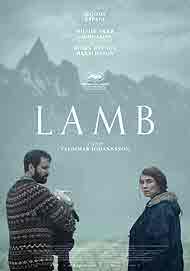

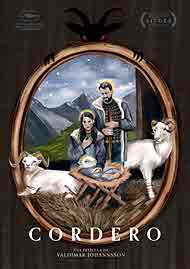

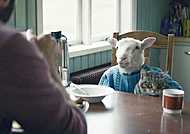
Fantasy about bizarre human/sheep hybrids
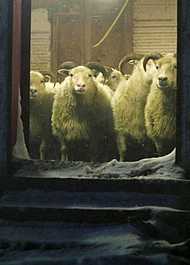
About SHEEP in the Bible
What is the significance of LAMBS in the Bible?
RAMS in the Bible
Nudity in movies—Why are humans supposed to wear clothes?
Brother-in-law making repeated sexual advances to his brother’s wife and even using blackmail to get what he wants
Drunken party
About murder
About death
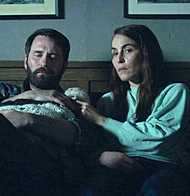
Grief and sadness following death of a daughter
Wife mourns the death of her husband
Husband and wife relationship
Worried wife
Rural life / farm
FILM VIOLENCE—How does viewing violence in movies affect families? Answer
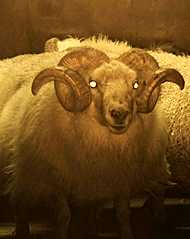
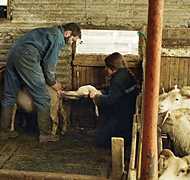
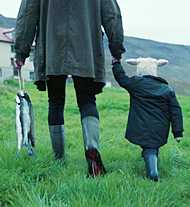
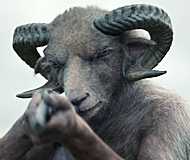
| Featuring |
|---|
|
Noomi Rapace … Maria Hilmir Snær Guðnason (Hilmir Snaer Guonason) … Ingvar Björn Hlynur Haraldsson (Bjorn Hlynur Haraldsson) … Pétur See all » |
| Director |
| Valdimar Jóhannsson (Valdimar Johannsson) |
| Producer |
|
Go to Sheep [Iceland] Black Spark Film and TV [Sweden] See all » |
| Distributor |
If you have seen the trailer for “Lamb,” you probably came away thinking, “Well, that was weird.” And indeed it is.
The A24 distribution company has almost become synonymous with a certain style of unnerving, disturbing horror films such as “Midsommar” or “The Witch.” I have not watched those, but did appreciate “Room” by this same company. It was less about the situation (captivity) and more about human relationships and the response to freedom. I find that “Lamb” could also fit into that category… a film less about the crazy situation (a lamb-child) and more about the human reactions and emotions involved.
I look at it as a “what if” scenario: What if a lonely couple decides to raise a baby that is not quite human? What could drive them to do so? How would others react? Can such an unnatural thing bring lasting happiness? Indeed, the director Valdimar Jóhannsson said that the idea of a lamb-human hybrid sparked the concept for the film.
I have read much speculation on the symbolism of various components in “Lamb,” and without knowing the actual intentions of the filmmakers it will have to remain speculation because answers just aren’t supplied in the film. One reviewer’s “explanation” might be the complete opposite of another, and neither might fit with my own conclusions. So I have chosen to not dwell much on symbolism or interpretation of such an odd film, but to accept the unusual situation at face value and examine what we actually see unfold onscreen.
I do not often watch films in the horror genre, but wanted to see “Lamb” only because I sensed from the trailer that it was not really about a monster, but about loss and longing for a child. I am drawn to such films after having gone through six miscarriages and many years of infertility. I am well-acquainted with grief, and know what it is like to long for something that may never be. These experiences lead me to be especially interested in films dealing with the loss of a child, such as “Lamb.” How will the characters deal with this? In what will they place their hope?
Q & A
Why does God allow innocent people to suffer?
What about the issue of suffering? Doesn’t this prove that there is no God and that we are on our own? Answer
ORIGIN OF BAD THINGS—Why are they in our world if a good God created us? Answer
 Why is the world the way it is? If God is all-knowing, all-powerful, and loving, would He really create a world like this? (filled with oppression, suffering, death and cruelty) Answer
Why is the world the way it is? If God is all-knowing, all-powerful, and loving, would He really create a world like this? (filled with oppression, suffering, death and cruelty) Answer
About hope
There will be some minor spoilers here, but it is almost impossible to avoid these in a review. If you do not want to have some basic elements of the movie revealed (although not much beyond what was shown in the trailer), move on to “content of concern” below.
The film opens with an ominous unseen presence lurking in the harsh and starkly beautiful Icelandic countryside. Meanwhile, an isolated farming couple solemnly prepares for a Christmas meal. Later, as we see the daily lives of this couple during the busy lambing season, we notice that although they work well together, they are quiet and sad. A hint of a melancholy smile forms on the lips of Maria (Noomi Rapace) as she helps clean a newly birthed lamb, with her husband Ingvar (Hilmir Snær Guðnason) watching. There is an unspoken but obvious longing here, with further hints at a great loss which has created a gulf in the intimacy between them.
As Ingvar shares a news article about the theoretical possibility of time travel, we see that he believes he can be satisfied with the life they lead now. Yet Maria thinks only of going back in time, presumably to some unnamed “before” in their lives.
As the film progresses, we see more and more hints toward the loss of a little girl, although it is never fully explained in detail. But even more so, we see what such a grief can do to a couple, and how it can affect their decisions and reasoning.
It is odd that there is no formal word for parents who have lost a child. We have other such labels for those who have gone through the death of a spouse or parents… widow, widower, orphan. Recently, the Sanskrit word “vilomah” (meaning “out of the natural order”) is gaining some following, but it is not readily recognized by many. The death of a child is something so terrible and tragic that most don’t even want to contemplate it.
It is such a great loss that many marriages do not survive. And thus we have Maria and Ingvar, existing together but clearly missing the life and vibrancy which their daughter once brought to this isolated home.
So when a strange, impossible child with the head and arm of a sheep is born to a ewe on their farm, the couple embraces her as a treasured gift and a new start. Science has shown that such a hybrid of man and beast is not possible, and it is never implied that this creature was born from a sexual union between the ewe and Ingvar (although many viewers might assume this). We can also see from God’s word that only humans are made in the image and likeness of God and have an eternal soul (Genesis 1:26-27; 5:1-2), and that not only was mankind made differently from the animals but was even created to have dominion over them… including the “beasts of the field” such as the flock of sheep that Ingvar and Maria raise for wool and meat.
Yet here is a lamb-child, living in the home, wearing the clothes of the deceased daughter and even bearing her name. We have to just accept that in this movie, this disturbing impossibility is reality.
The viewer’s emotional reactions to the lamb-child may possibly be mirrored by the third character to suddenly appear in the film, Ingvar’s down-and-out brother Petur (Björn Hlynur Haraldsson). He is confused and even repulsed by what he finds going on in his brother’s home.
Petur is a man dealing with loss and longing himself… the loss of his music career through repeated bad decisions and his lustful, unreturned longing for a sexual relationship with Maria. These three and the creepy (but also somehow cute) lamb-child comprise the main characters in this slow burn of a movie that finally explodes in a sudden and shocking conclusion.
While the foggy mountain setting is eerie, the mood is ominous, and the conclusion needlessly violent, I can’t say if “Lamb” really felt like a “horror” movie. Disturbing, yes, but also thoughtful in some ways. Through the impossibility of the crazy situation, we see genuine human emotions displayed. The actors take their roles as seriously as if this is a regular drama film, and not as if a child with the head and hoof of a lamb is walking about dressed in human clothing and an unseen monster is lurking in the windswept mountains.
But although it is not necessarily a horror movie, it is disturbing and includes violence, as well as other content of concern.
Content of Concern
LANGUAGE: There is brief strong language, spoken in Icelandic but written in English subtitles. These include the F-word (at least once) and God’s name used in vain and paired with “damn.” There may have been others that I missed due to the spoken language.
VIOLENCE: There are some scenes of intense, bloody violence. Real sheep actually give birth assisted by their caretakers, in close camera angles with blood shown. A couple of animals are violently killed, one offscreen, but we see its maimed body. A man is tossed roughly down by others. A character is threatened with a gun. There is a prolonged, close up bloody death scene.
SEX/NUDITY: In one scene, we see a couple having sex, and there are extended, close views of her bare breasts being fondled. *** SPOILER *** A monstrous nude (masculine) creature is shown from the rear. *** END SPOILER *** A man makes repeated sexual advances to a woman and says suggestive things to her. A woman is seen in the bath (nothing shown below the collarbone) and sometimes in a slightly revealing night dress. There are a couple of brief kisses. We very briefly see a toddler’s bare bottom.
DRUGS/ALCOHOL: In one scene the three leads drink excessively and behave drunkenly. A character smokes.
OCCULT: An ominous presence can be heard breathing, and is later revealed to have a frightening and almost demonic aspect. An unnatural creature is born.
Along with these content issues, there is also a feeling of draining despair to the movie. We have characters who have suffered great loss and who are seeking happiness through something very unnatural, but which they see as a “gift.” When Petur asks Ingvar, “What is happening here?” his brother responds with one word: “Happiness.” And although the immediate longing of Maria and Ingvar’s hearts might be satisfied, those of us watching know that it can’t last.
But really most of us are not much different. Almost everyone has a longing for something, that one thing which we believe will finally bring true fulfillment. In most cases, after attaining it, we learn that “happiness” can go just as it came. And even those who think they have found earthly fulfillment for the entirety of their lifetime will one day understand that their time on Earth is merely a small slice out of the time they have in eternity… and that they will be spending that eternity either in never-ending joy with Christ or in eternal despair without Him.
Using our lives which were created to seek after a relationship with God to fulfill a worldly longing, no matter how good it may seem, will not bring us true and lasting contentment. The only way to have this both in our brief Earthly life and our eternal life is through a relationship with Jesus.
Q & A
 Discover the good news that Jesus Christ offers
Discover the good news that Jesus Christ offers
 Why is the world the way it is? If God is all-knowing, all-powerful, and loving, would He really create a world like this? (filled with oppression, suffering, death and cruelty) Answer
Why is the world the way it is? If God is all-knowing, all-powerful, and loving, would He really create a world like this? (filled with oppression, suffering, death and cruelty) Answer
Are you good enough to get to Heaven? Answer
Maria and Ingvar do not turn to the Lord for fulfillment in their loneliness and pain, but instead welcome something which is clearly unnatural and perhaps even unholy. The only hints we see at faith in the film are crosses in a family cemetery and Maria looking up and making the sign of the cross as she visits a grave.
In a faithless life disconnected from God, people often do not see the gifts that have been given to them because they are searching so hard for the one thing they desire. I found it hard to watch as the characters grasp at this worldly, temporary happiness while ignoring the One who can bring lasting fulfillment… and even contentment despite grief and loss.
I did not in any way expect this to be a Christian film, but because I am someone who knows the way of truth through Christ, I found it hard to watch without being depressed for this couple as they look for contentment in something which cannot last.
Because it is such a slow-moving film, those who are seeking action and terror will be dissatisfied. Others will appreciate the emotion and acting, but may find the story too deeply disturbing. Those who were hoping for a happy ending will definitely be dismayed, but then one also wonders what a happy ending could possibly look like in such a situation. I know that I was left sad and unsatisfied with the conclusion, but I can’t express how it should have ended. I’m not exactly sure who this movie is for, and there are enough content concerns—coupled with disturbing imagery—that I can’t recommend this film for Christian viewers.
- Violence: Heavy
- Profane language: Heavy
- Vulgar/Crude language: Heavy
- Nudity: Heavy
- Sex: Heavy
- Drugs/Alcohol: Moderately Heavy
- Occult: Moderately Heavy
See list of Relevant Issues—questions-and-answers.


PLEASE share your observations and insights to be posted here.
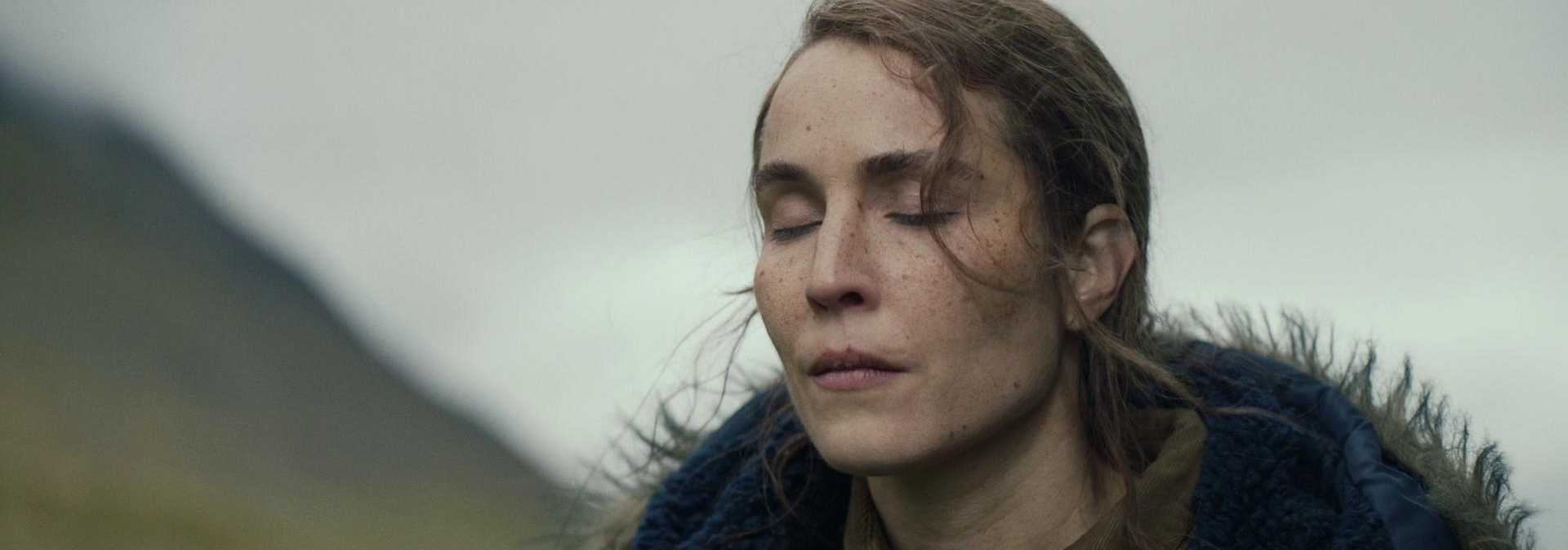

My Ratings: Moral rating: / Moviemaking quality: